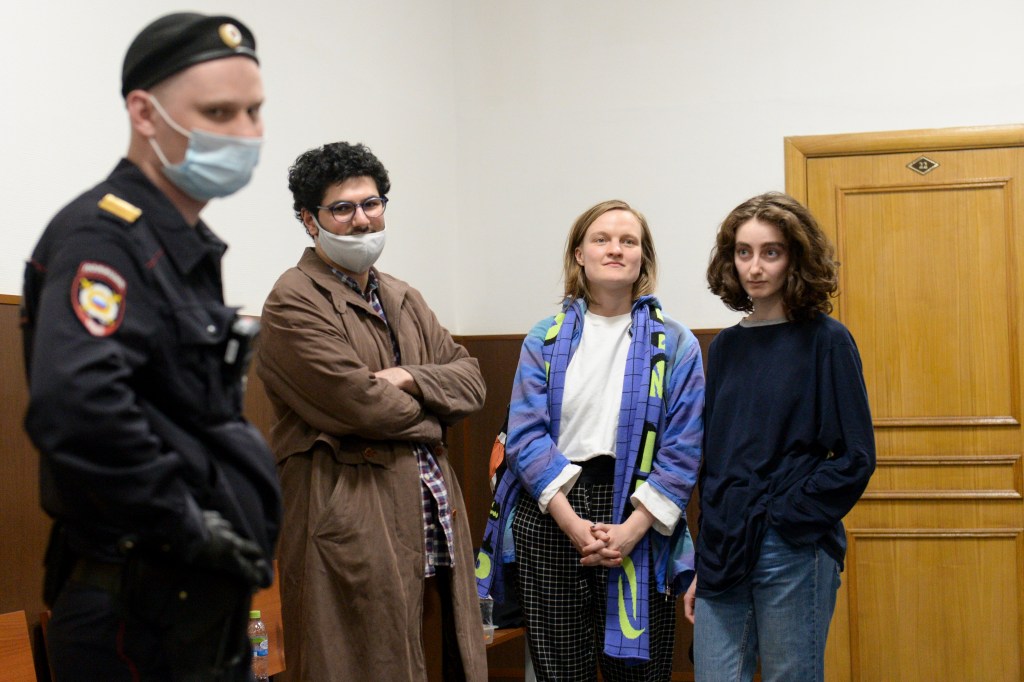New York, April 15, 2021 – Russian authorities should immediately drop all charges against DOXA editors Armen Aramyan, Natalia Tyshkevich, Vladimir Metelkin, and Alla Gutnikova, and allow them to work freely and safely, the Committee to Protect Journalists said today.
Yesterday, law enforcement officers in Moscow raided the office of the independent student-run magazine DOXA and the apartments of the four editors, and arrested them, according to news reports and Mstislav Grivachev, a DOXA editor who was not detained, who spoke with CPJ in a phone interview.
Officers took the journalists to the Investigative Committee of the Russian Federation, where they were held for about two and a half hours and charged with “calling or otherwise involving minors into unlawful activities that might be dangerous,” according to those sources.
The four were then sent to the Basmanny District Court, which set the terms of their release, according to those reports, Grivachev, and Leonid Solovyov, Aramyan’s lawyer, who spoke with CPJ in a phone interview. If convicted, they could face up to three years behind bars under Russian law.
The court ordered Aramyan, Tyshkevich, Metelkin, and Gutnikova released and placed under home detention, with a ban on leaving their homes from midnight until 11:59 p.m. each day until their trial, set to begin on June 14, according to those reports, Solovyov, and Dmitry Zakhvatov, Gutnikova’s lawyer, who spoke with CPJ via phone. They are also banned from using the internet or other communications tools and from interacting with other defendants in the case, according to those sources.
“Russian authorities should immediately drop all the charges against the DOXA editors, return their equipment, and let them do their jobs covering important political events in the country without fear,” said Gulnoza Said, CPJ’s Europe and Central Asia program coordinator. “It’s apt, but sad, that student journalism in today’s Russia must include a lesson in just how afraid Vladimir Putin’s government is of independent news coverage.”
DOXA is an online magazine covering higher education issues; it was originally affiliated with the Higher School of Economics in Moscow, but in 2019 that school withdrew its financing, and the outlet is now run independently by students from various universities, according to Grivachev and reports.
Solovyov told CPJ that the search of the DOXA office, where Aramyan was at the time, was conducted illegally as there were no third-party witnesses present. Solovyov said that he arrived at the scene and identified himself as Aramyan’s lawyer, but an investigator refused to let him in and a law enforcement officer repeatedly shoved him.
Solovyov said that he would file formal complaints regarding all the violations to the Investigative Committee. He told CPJ he was not injured in the shoving.
During the raids, officers confiscated laptops, phones, and filming equipment from DOXA’s office, and laptops and phones from the journalists’ apartments, according to those news reports and Grivachev.
The Investigative Committee officers told the journalists that their charges stemmed from a video DOXA published in January 2021, amid nationwide protests in support of opposition figure Alexei Navalny; the video, titled “They Can’t Defeat Youth,” expressed support for students who had been punished by their educational institutions for participating in rallies, according to news reports and Zakhvatov. DOXA later deleted the video on the order of Russian state media regulator Roskomnadzor, according to those reports.
According to the journalists’ lawyers, Grivachev, and news reports, the video did not contain any calls to join the protests, but only expressed concern for those students. CPJ was unable to review the video.
None of the journalists admit any guilt, according to Zakhvatov and Solovyov. Zakhvatov said the case was an example of the state attempting to “create an atmosphere of fear by targeting journalists.”
CPJ emailed the Investigative Committee of the Russian Federation for comment, but did not receive any response.
